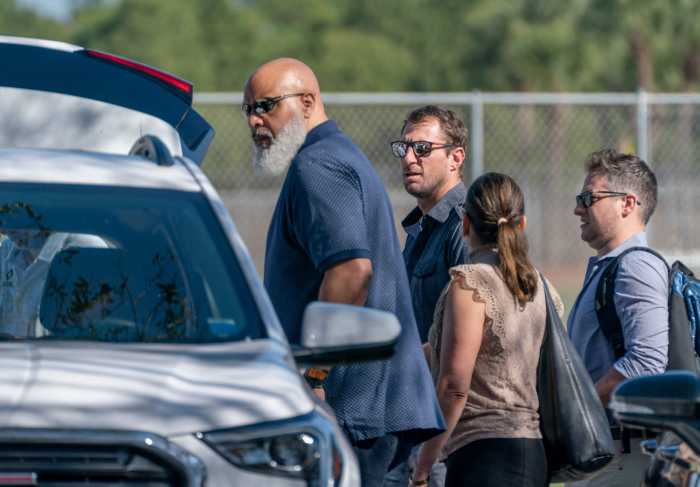Federal court rules lesbian Air Force major, though discreet, must still be bounced
Another federal court has rejected a constitutional challenge to the statutory ban on military service by gay people. In a decision announced on July 26, U.S. District Judge Ronald B. Leighton in Tacoma, Washington, dismissed Major Margaret Witt’s challenge to her discharge proceedings, finding that Congress had a rational basis to mandate dismissal of military members discovered to be gay, regardless of the quality of their service records.
The irrationality of the policy as applied to Major Witt is striking. According to Leighton’s opinion, she “is a highly decorated, well-respected flight nurse in the United States Air Force Reserves. She was a Standards and Evaluations Flight Commander with management responsibility for more than 200 flight nurses and medical technicians. She has been used extensively as a role model in Air Force recruiting publications.”
Leighton’s opinion also makes clear that Witt did nothing to violate the policy against being openly lesbian. Instead, she had a discreet relationship with another woman, a civilian, from 1997 through 2003, and any sexual activity took place in that woman’s home in Spokane, “across the state from Major Witt’s duty station at McChord Air Force Base, outside of Tacoma.” There is no dispute that “Witt did not ever engage in homosexual conduct on the base, or with a member of the military.”
The Air Force received “an apparently anonymous allegation that Major Witt was a lesbian” in mid-2004, and launched an “investigation.” In other words, they asked her, and she was honest and told them the truth.
This chain of events is at odds with the typical characterization that the policy is based on service members not telling and military authorities not asking, not pursuing, and not harassing.
Witt was told she would be processed for discharge, and that she could not report for duty or earn military pay or points toward promotion and her pension, pending outcome of her case. Then she was left to stew about it. She requested a hearing, as was her right, but none was scheduled until she filed her lawsuit challenging the anticipated discharge, at which point a hearing was finally set for later this year. The government moved to dismiss the case in response to Witt’s motion for a preliminary injunction to stop her discharge.
Witt’s case shows a serious potential for abuse and national security breaches under the Don’t Ask, Don’t Tell (DADT) policy. If the military can move against highly-qualified service members on the basis of anonymous allegations, the possibility of blackmail or revenge “outings” looms, and neither is consistent with the national interest.
Judge Leighton analyzed the case in a manner virtually identical to Judge George O’Toole from Boston, who ruled against the Servicemembers Legal Defense Network’s challenge to the military policy in April.
The key legal issue in a constitutional challenge to a government policy is the level of judicial scrutiny that will be applied. Government policies are usually presumed to be constitutional, placing a heavy burden on the challenger to prove that they are based on no rational justification. However, if the policy in question abridges a fundamental right or unjustifiably discriminates on a basis the courts view as a “suspect classification”—generally race or gender— the presumption of constitutionality is reversed and the burden of justification is placed on the government to show a compelling reason for a policy that can be achieved in no other way.
Witt argued that in light of Lawrence v. Texas, the 2003 Supreme Court case overturning sodomy laws, the military policy burdens a fundamental right of liberty for gay people, and also improperly discriminates based on sexual orientation. The problem, however, is that lower federal court judges have almost uniformly viewed Lawrence v. Texas as a narrow decision that did not change the basis for analyzing gay rights cases—sexual orientation is still not considered a suspect classification.
Military appeals courts have used Lawrence to find that the military must provide a particular justification in going after uniformed personnel for engaging in sodomy, but have continued to uphold convictions unless the behavior was not between service members of different ranks and took place privately, preferably off-base. Under this approach, ironically, Witt would probably prevail if prosecuted for sodomy.
But for a violation of Don’t Ask, Don’t Tell, the military justifies its policy on the grounds of the good order and morale of the fighting force.
Both Leighton and O’Toole chose not to contradict Supreme Court Justice Scalia’s dissent in Lawrence that overturning sodomy laws was not based on the view that there is a fundamental right to gay sex, but rather on the lack of any rational case for banning such conduct.
Whatever view Leighton had regarding the rationality of Don’t Ask, Don’t Tell, he was bound by precedents set by the 9th Circuit Court of Appeals, which several times has upheld the policy.
Noting Witt’s circumspect behavior and outstanding record, Leighton wrote, “This court is not unsympathetic to the situation in which Major Witt currently finds herself… It is tempting to accept plaintiff’s urging to apply DADT narrowly within the context of Margaret Witt’s individual circumstances. This the court cannot do.”
Leighton specifically made note of the deference that courts pay to the military’s rationale and expert opinion regarding policies affecting national defense.
“Court review of Congressional enactments is especially deferential in the military context,” he wrote. “It is difficult to conceive of an area of governmental activity in which the courts have less competence… The government’s rationale for DADT is that excluding from military service homosexuals who engage in or have the propensity to engage in homosexual acts furthers discipline and combat readiness in the military by preventing risks to unit cohesion posed by the presence of such homosexuals… The Congressional Record on this topic is voluminous.”
For Leighton, the bottom line was that he was bound by precedent.
“Prior to Lawrence v. Texas, DADT had been found constitutional under equal protection analysis and First Amendment case law,” he concluded. “The majority opinion in Lawrence did not change the framework within which DADT should be evaluated.”
Witt, who is represented by the American Civil Liberties Union of Washington, could appeal this ruling to the 9th Circuit Court of Appeals in San Francisco, but that court has helped buffer existing precedents.
gaycitynews.com



































